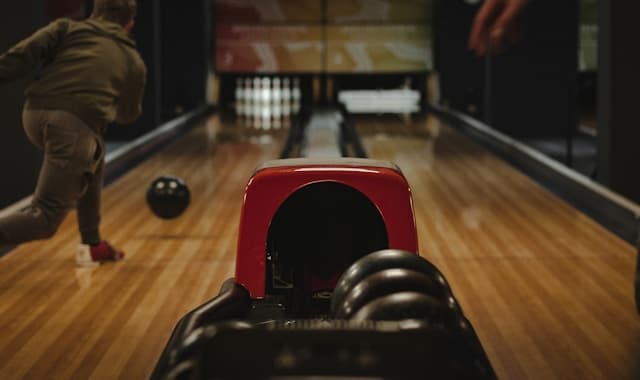What are effective mental game strategies for bowlers in high-pressure tournaments?

Bowling, a game of precision and skill, has a rich history dating back to the Ancient Egyptians. The modern version of the game as we know it began to take shape in the late 19th century and has since grown in popularity. Today, bowling is played and enjoyed by millions worldwide—from the flat plains of the Midwestern United States to the bustling city streets of Tokyo, Japan.
Despite its seeming simplicity, bowling is a complex game that tests not only physical prowess but mental stamina as well. This is especially true in high-pressure tournament settings, where the stakes are higher and competition fiercer. Here, we will delve into the mental strategies every bowler can employ to stay on top of their game, whether they’re a beginner learning the ropes or a seasoned pro like Tyrel Rose or Dean March.
Cela peut vous intéresser : What are the best practices for sleep hygiene to maximize recovery for elite athletes?
Understanding the Mental Game: Bowling Beyond the Physical
Before we delve into specific strategies, it’s important to first understand that bowling is just as much a mental game as it is physical. While physical skill—your swing, release, and accuracy—can be honed through practice, the mental side of the game is often left unaddressed.
This is surprising given the significant role mental focus plays in bowling. Imagine yourself in a tournament in July or November, the pin at the end of the lane gleaming under the spotlight. The crowd behind you is silent, all eyes are on you. The pressure can be overwhelming for even the most seasoned bowlers, and it’s in these moments that the mental game comes into play.
Sujet a lire : How does altitude affect the physiological performance of cyclists during mountain stages?
The Role of Mental Coaching: Insights from Professionals
Coaching in bowling often focuses on the physical component of the game—perfecting the swing, honing accuracy, and mastering the art of reading the lane. However, mental coaching is just as essential for bowlers looking to thrive in high-pressure environments.
Professional bowlers Tyrel Rose and Dean March have often spoken about the value of mental coaching in their journey. They credit their ability to consistently perform at a high level and under pressure to their mental preparation. In fact, it was only in September that Rose emphasized the role of mental resilience in his performance at championship games.
Bowlers can benefit from mental coaching in several ways. It enhances focus, helps manage pressure, and improves overall performance—critical factors in high-stakes games or tournaments.
Strategies for a Strong Mental Game: Practical Tips for Bowlers
There are several practical strategies bowlers can employ to strengthen their mental game.
First, visualize your success. Positive visualization is a proven technique used by athletes across the sports spectrum. Imagine yourself in the lane, releasing the ball smoothly and knocking down all the pins. Visualization not only boosts your confidence but also helps combat performance anxiety.
Second, practice mindfulness. Being present in the moment helps you concentrate on the task at hand, and not get distracted by external factors like the cheering crowd or the score. Deep, controlled breathing exercises can aid in mindfulness, calming your nerves and helping you maintain focus.
Third, adopt a consistent pre-bowl routine. A routine, once established, becomes a habit, providing comfort and familiarity amidst the pressure of a tournament. This could be as simple as a specific warm-up routine or even a specific way of holding and releasing the ball.
The Path to Mastery: Persistence and Practice
The strategies mentioned above—visualization, mindfulness, and routine—can certainly fortify your mental game. However, consistently applying these strategies in practice and games is the key to mastering the mental aspect of bowling.
Remember that mental strategies are not a magic bullet—they require persistence and repeated application. You might not notice immediate changes in your performance, but over time, as you continue to implement and refine these strategies, you’ll see the difference they can make.
Professional bowlers didn’t achieve their mental fortitude overnight. For instance, it wasn’t until October 2021 that Dean March started incorporating mindfulness into his training after a disappointing performance in a tournament. Today, it’s a crucial part of his preparation and has helped him maintain his composure during critical moments in games.
Embracing the Mental Game: The Future of Bowling
Bowling, like many other sports, has evolved over time. The focus has shifted from not just perfecting the physical but also mastering the mental aspects of the game. More and more bowlers are recognizing this shift and incorporating mental strategies into their training.
As the sport continues to grow in popularity and competitiveness, the mental game will continue to play a crucial role in bowling. Whether it’s a local league in July or an international championship in November, bowlers who cultivate mental resilience alongside physical skills will have the advantage.
Remember, bowling is not only about throwing the ball down the lane—it’s also about handling the pressure that comes with each throw. So, next time you find yourself on the bowling lane, take a deep breath, visualize your success, and let the game play out. After all, the mental game is where the real game begins.
From the Experts: Insights from Tyrel Rose and Other Bowling Professionals
Bowling professionals like Tyrel Rose, Dean Champ, and Heather Sterner have been vocal about the essential role of the mental game in their success. They emphasize that the ability to maintain focus and remain calm under pressure has been as important, if not more so, than their physical skills in bowling.
Rose, a renowned bowling coach and accomplished player, has said that the key to success lies in refining both the physical and mental aspects of the game. In a recent round table discussion, he highlighted the importance of mental coaching, citing his personal experience in high-stakes tournaments.
Similarly, Champ and Sterner have shared their own experiences on the importance of a robust mental game. Champ advocates for the use of visualization techniques, while Sterner emphasizes the importance of mindfulness and concentration.
In the words of Joe Slowinski, another respected bowling coach, "Bowling is a game of mental toughness. You need to be able to read the lane play, understand ball motion, and make quick decisions. But none of that matters if you can’t keep your cool under pressure."
These insights from professional bowlers and coaches underline the importance of the mental game in bowling, especially in high-pressure tournament settings.
Coaches and Mental Game Strategies: The Role of Ernesto Avila and Joe Hoenig
Bowling coaches play a huge role in helping bowlers hone their mental game. Coaches like Ernesto Avila and Joe Hoenig have been at the forefront of promoting mental strategies in bowling coaching.
Avila, a seasoned coach, has long advocated for the inclusion of mental strategies in coaching. He stresses the importance of bowlers being able to adapt to changing lane conditions and maintain composure, regardless of the game’s outcome. He believes that mental resilience is a critical factor in turning good bowlers into great ones.
Similarly, Hoenig, another well-respected bowling coach, has devoted much of his coaching career to the mental aspect of the game. He emphasizes the importance of staying focused and maintaining a positive mindset, even when faced with challenges on the lane.
In a recent book report by Chris Mesagno, a sports psychologist, the importance of mental strength in bowling is further emphasized. Mesagno’s research shows that bowlers who regularly practice mental strategies, such as visualization and mindfulness, not only perform better in tournaments but also enjoy the game more.
In Conclusion: Embrace the Mental Game
In bowling, as in other sports, the mental game plays an equally significant role as the physical game. Whether it’s a practice session or a high-stakes tournament, the ability to stay calm and focused can be the difference between a good game and a great one.
Pro bowlers like Tyrel Rose and coaches like Ernesto Avila and Joe Hoenig have underscored the importance of mental strategies in bowling. Techniques like visualization, mindfulness, and maintaining a consistent routine can greatly enhance a bowler’s performance.
Remember, the path to becoming a great bowler involves more than just perfecting your swing and understanding ball motion. It’s about strengthening your mental game, staying resilient, and remaining focused, no matter the pressure.
So, next time you step onto the lane, don’t just think about how you’re going to throw the ball. Think about your mental approach, too. As Heather Sterner said in a recent round table discussion, "The game doesn’t start when you release the ball. It starts in your mind."
No matter if it’s bowling month or any other month of the year, always remember – the mental game isn’t just a part of bowling, it’s where the real game begins.
